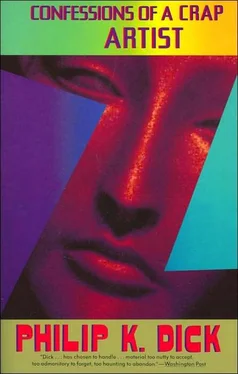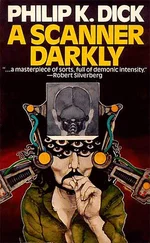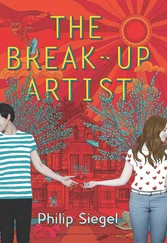“I came by during the day,” she said. “Where were you?”
“Out,” I said.
Fay said, “Are you going to get psychiatric help?”
“I haven’t thought about it,” I said.
“Maybe if you go see Doctor Andrews you’ll get more insight into your situation. Why won’t you sell your part of the house? I talked to him today and he says that you identify with Charley and are getting revenge on us for his death. You hold us responsible for him killing himself. Is that why you won’t sell? Good god, think of the children. They’ve lived in that house ever since it was built. – we actually built it for them, not for ourselves. And that’s virtually all the son of.a bitch left me, except for that nothing factory that hardly makes enough to pay its own way. I have to have that house—half of it is mine, and you can bet your bottom dollar I’ll never let my half go. Anyhow, you couldn’t buy it from me. Could you? My god, you can’t even pay the buckfifty water bill.”
I said nothing.
Fay went on, “I think we’ll come over and discuss it with you. We’ll see you in about fifteen minutes.”
Before I could tell her that I was totally exhausted and about ready for bed, the phone had clicked. She had hung up. It never occurred to her to inquire whether I wanted to discuss it with her or not. That’s the way she’s always been; nothing will ever change her.
Even more depressed than before I sat waiting for them to come. In a sense she was right; the children belonged in the house, and since she refused to live with me, the children would not be living here unless I moved out. She, of course, considered it her house, and to a degree it was. But certainly it was not her house in the sense that she meant it: that it was hers and no one else’s. The fact of the matter was that the house belonged to Charley, and that he had divided it between her and me, with the obvious idea that both of us would live here. Charley assumed that since Fay and I were sister and brother we would be able to live together. What he thought Nat Anteil would do I have no idea. Possibly he did not realize that Anteil’s wife had left him and that their marriage was over. He may have assumed that the relationship between Fay and Nat was only a passing affair. In that, he was not alone; none of us had thought of it persisting. Had Charley come back and not killed himself—nor Fay—then no doubt her assignations with Anteil would have come to an end. In some respects it is a shame that Charley did not see that. He had only to return to the house to put an end to the situation—at least, to keep them from physically coming together. Of course, the bond between them might continue, and that was why he did what he did. He had wanted to punish her for what she had done. I think he was right. She deserved whatever she got. However, at the end, she had outsmarted him and gotten him to kill himself instead. Even though he had drawn up a will that excluded her from the body of his estate, she still had her life, her half of the house, her children, and the household goods—even the car. And all that remained of Charley was the eternal presence that pervaded the house, the presence that I felt so keenly all the time I was there.
In fact, even now as I sat trying to see a way out of this dilemma, I sensed Charley around the house, in each part of it in proportion to the extent that he had inhabited that part while physically alive. Especially in the study, where he had worked at night. – .1 felt it there the most. And the kitchen, where he ate, the living room where he sat. Not so much in the children’s rooms or even their bedroom. And not at all in Fay’s work room, where she did her clay modeling. Her creative stuff.
What he hadn’t realized was that if he had killed her, nobody would ever have had a happy moment again. Think what the effect would have been on the children. Their lives would have been blighted. He himself would have nothing left ahead of him but death from his heart condition, unless he had planned to kill himself, too. Nat Anteil had already given up his wife, seen his brief marriage to her end, and, with Fay dead, what would there be in store for him? Who would have gained?
The nthilism of what Charley did is shown in his killing of the animals. That part affected me the most; I had the greatest difficulty understanding it.
Surely he hadn’t hated the animals as he hated Fay; he couldn’t possibly have thought that the animals had betrayed him—although of course the dog had learned to greet Anteil rather than to bark at him. To follow the logic of that, however, he would have had to kill his own daughters, since they both liked Anteil, and he would possibly even have had to kill me, since the girls liked me very much. Maybe he planned to. Anyhow, the sheep cared for nobody on earth, and the ducks, to the extent possible with their limited minds, kept a loyalty to him. After all, it had been he who built their pens.
After thinking it over steadily, I came to the conclusion that he had not known he was killing the animals, that he had only been conscious that when he got back to the house after being in the hospital, there would be some great change , which he himself would bring about, and that this change would affect all the living creatures there. He shot the animals to show that what he did mattered. He could do something that couldn’t be undone. And yet, even deciding this, I felt then—and still feel now—that the actual reasons for his actions are beyond my scope. I don’t understand his kind of illogical, semi-barbaric mind. It was not a question of scientific reason; it was brute instinct. Perhaps he identified the animals with himself. Possibly he was already beginning on the path of killing himself, that he knew in some part of his mind that he would never kill Fay; that it would be he who would end up getting shot, not she. Or possibly he hadn’t even wanted to kill her, that he had only gone through the motions. Possibly he had meant to kill himself all the time, from the moment he bought the gun.
In that case, she was not to blame. At least, not as much.
But a confusion like this always results when the unscientific individual is involved. Science is baffled by the unreason of the hoi polloi. The moods of the mass can’t be fathomed; that’s a fact.
While I was studying this entire situation deeply, and waiting for Fay and Nat, I heard their car drive up. So I got to my feet and went to the front door to turn on the driveway lights.
Only one person came from the car. It was Nat Anteil; my sister hadn’t come along.
“Where’s Fay?” I said.
Nat said, “Somebody had to stay with the girls.” He entered the house and shut the door after him.
His explanation, although reasonable, didn’t convince me. I had the intuition that she couldn’t bring herself to set foot inside the house as long as! was still there. And that made me feel just that much worse.
“Sometimes it’s easier for two men to discuss a business matter,” Nat said. “Without a woman.”
“True,” I said.
We sat down facing each other in the living room. Looking across, past the fireplace, at him, I got to wondering how old he was. Was he older or younger than I? About the same age, I decided. And look how little he had done with his life. A marriage that hadn’t lasted a bit. Involvement with a married woman that had ended in the death of an innocent man. And, from what I had heard, a fairly insecure economic position. The only thing he had over me was that, to be very honest, he was much better looking than I. He had that sweet, open face, roundish, and jet-black hair which he kept cut short. He was tall, too, without appearing scrawny or bony. In fact he looked to me like a tennis player, with very long arms and legs, but at the same time keeping himself in good physical condition.
Читать дальше










